72 Hours of #Gamergate
Two months ago today, actor Adam Baldwin was the first to use the #Gamergate hashtag on Twitter, solidifying a name for the movement that’s dominated all conversations in gaming since. Depending on where you sit on the issue, it’s either a widespread campaign of harassment against women or, actually, about ethics in videogames journalism.
Anyone who’s mentioned the #Gamergate hashtag in a critical light knows the feeling: a swarm of seemingly random, largely-anonymous people descending to comment and criticize.
I’ve been using Twitter for eight years, but I’ve never seen behavior quite like this. This swarming behavior is so prevalent, it got a new nickname — “sea lioning,” inspired by David Malki’s Wondermark comic.
I wanted to understand #Gamergate, how its proponents and critics behaved and the composition of both audiences.
So I wrote a little Python script with the Twython wrapper for the Twitter streaming API, and started capturing every single tweet that mentioned the #Gamergate and #NotYourShield hashtags from October 21–23.
Three days later, I was sitting on 316,669 tweets, along with a bunch of metadata for trying to understand the composition of both sides of the #Gamergate movement.
Why three days? It was a manageable and consistent slice of activity, taken at a time when the hashtag wasn’t trending and no major news was breaking, reducing the number of confused newcomers, bots, spammers, and other opportunists.
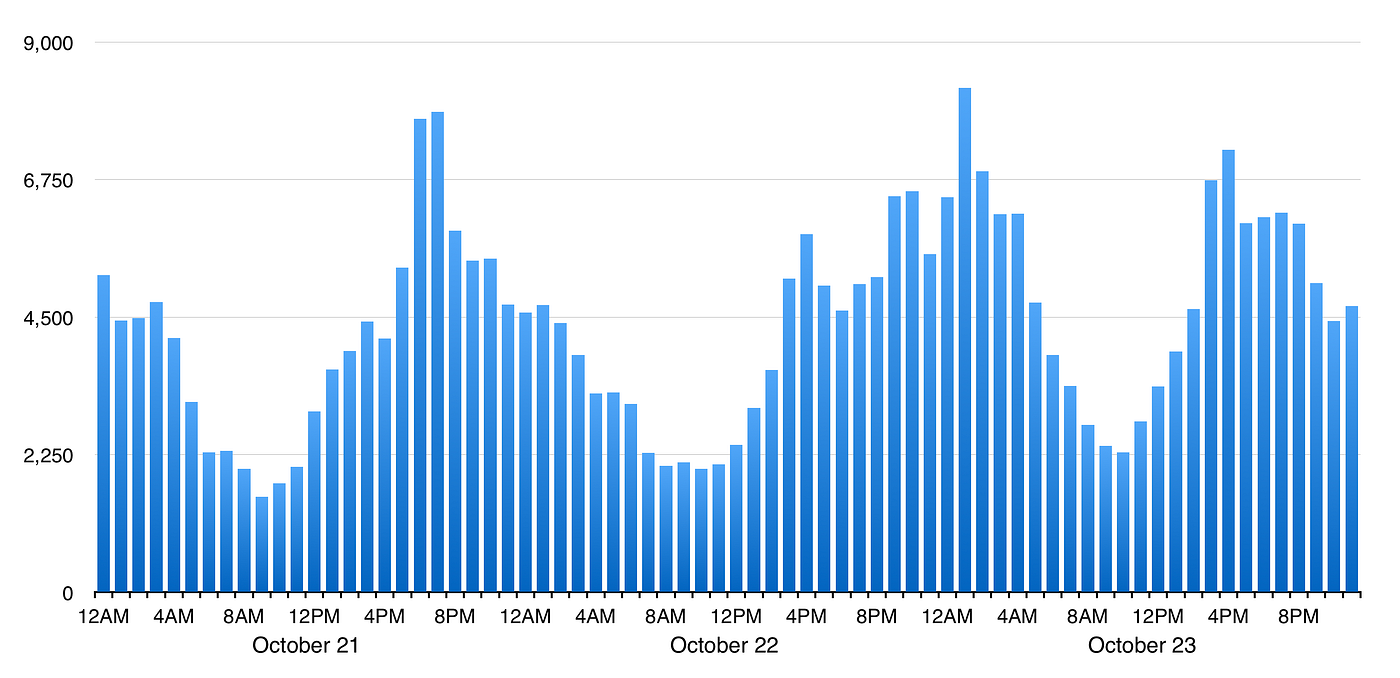
In the process of collecting the data, I posted a couple innocuous charts on Twitter and was predictably flooded with critical comments, many questioning my motives.
Without question, I have a strong anti-Gamergate bias. I co-organize a festival called XOXO that invited two frequent #Gamergate targets to speak, Anita Sarkeesian and Leigh Alexander. I backed Anita’s project, and I think they both do great work. I’m also friends or acquaintances with a few dozen independent game designers, developers, and journalists, most of whom have come out publicly against Gamergate. I think the whole thing’s pretty awful, and that it has critically wounded the public perception of videogames.
That said, I think the numbers below accurately and objectively reflect the data, and the analysis I’m doing is very straightforward. You could reproduce everything with a copy of Excel or Numbers.app. I included a dump of the complete dataset at the end of this post, and I encourage you to double-check my work.
Most of the posting activity to #Gamergate and #NotYourShield is retweets. (From here on, I’ll refer to both hashtags as just “#Gamergate” for readability’s sake.)
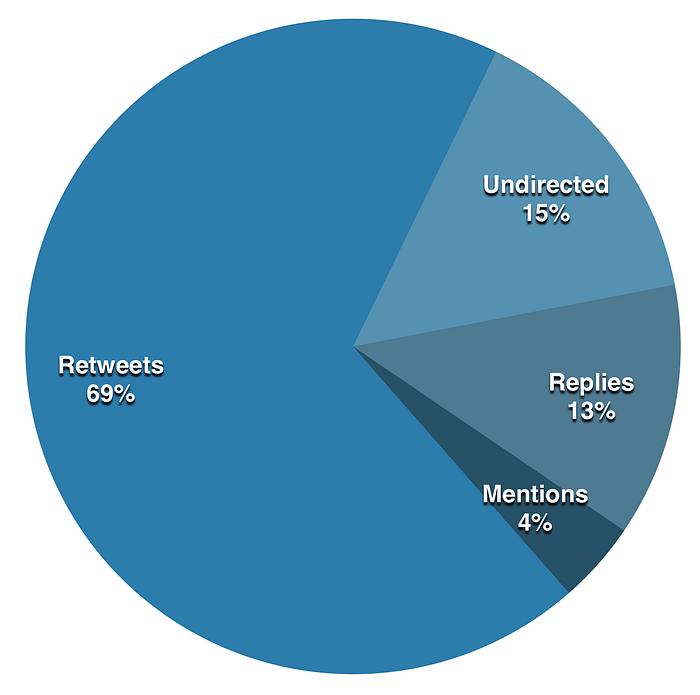
Out of 316,669 total tweets, 217,384 of them (about 69%) were retweets.
The remaining 99,285 (31%) were original tweets— 46,826 weren’t directed to anyone, 39,622 replied directly to another user, and 12,837 publicly mentioned one or more users.
In total, 38,630 user accounts posted to the two hashtags in those three days. Excluding retweets, that number drops down to 17,410 users.
With that out of the way, let’s look at who’s posting to #Gamergate.
Account Age
Gamergate is unusual in one respect: many of its proponents are using newly-created, often pseudonymous, accounts.
The chart below shows every tweet charted by the month that user signed up for Twitter.
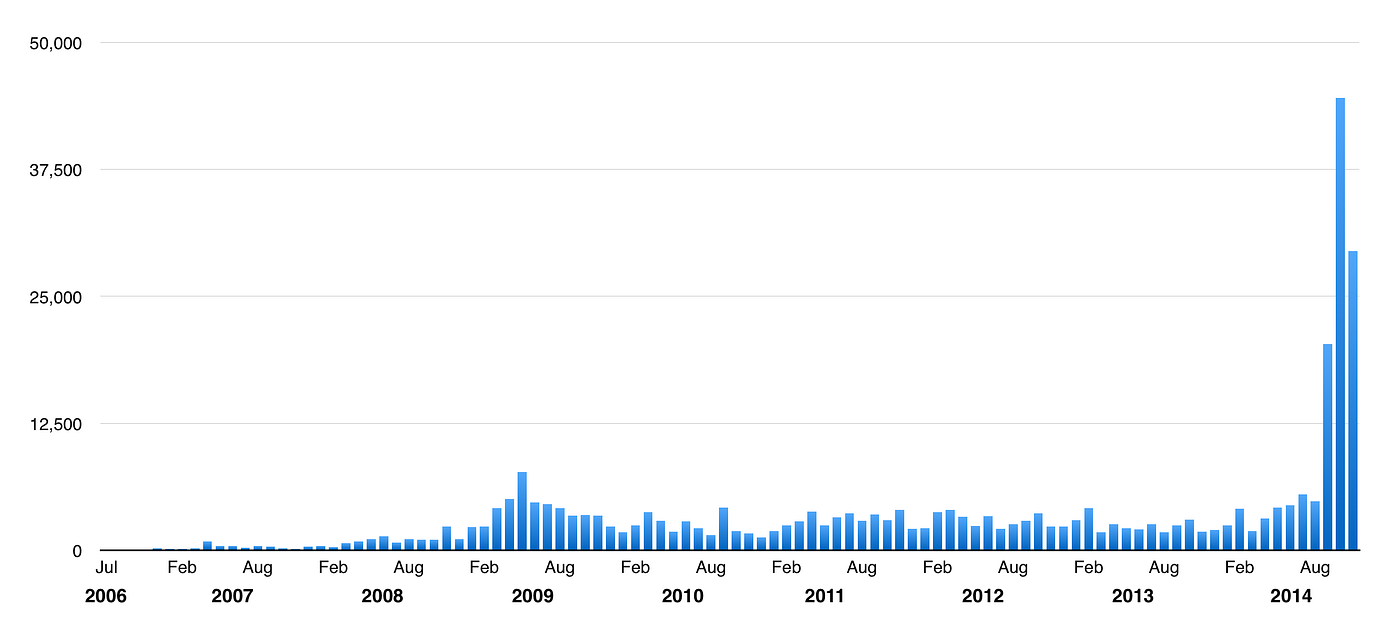
Roughly 25% of all Gamergate activity is coming from accounts created in the last two months.
To be clear, I’m not suggesting these accounts are bots or sockpuppets — one person controlling multiple accounts — but simply that these accounts are new to Twitter.
As Gamergate supporters were quick to point out, many of them joined Twitter simply because that’s where the debate was. Some created anonymous accounts to avoid being tracked and identified, while others joined only after being turned away from other forums.
Is this distribution unusual, though? For contrast, I tried another hashtag for a similar length of time, the #kashmirfloods hashtag used during last month’s tragic floods that ravaged northern India. The distribution is much closer to what you’d expect: evenly distributed, roughly following Twitter’s rise in popularity.
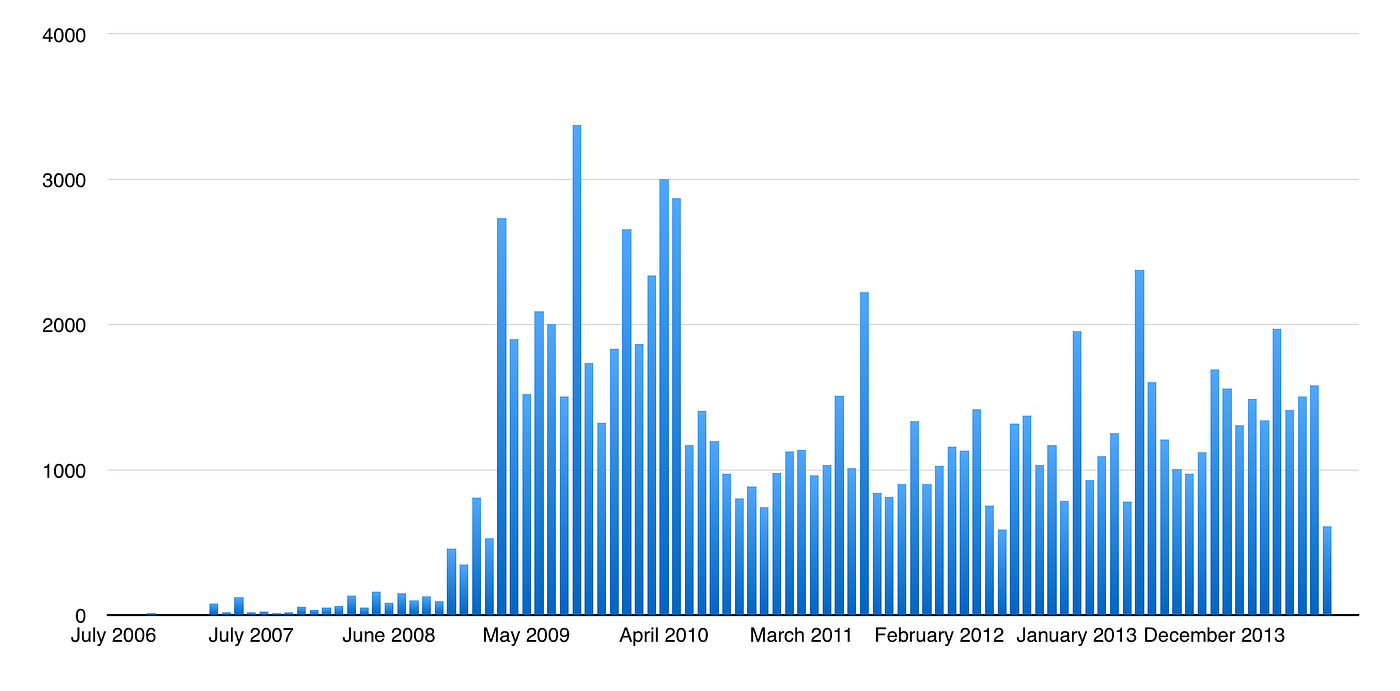
The Retweet Network
As you’d expect, there are two large communities contributing to the #Gamergate hashtag, and who they choose to follow and retweet are very, very different with little overlap.
There’s little overlap between communities.
For example, in this three day period, 1,673 users retweeted Anita Sarkeesian, while 2,240 users retweeted Blocker (aka Mr. Fart), one of the most prolific Gamergate tweeters. (Yes, the most retweeted person in #Gamergate is named “Mr. Fart.”) But only 79 users retweeted messages from both accounts.
Contrast that with the 1,138 users that retweeted messages from both Blocker and Gamergate proponent Milo Yiannopoulos in the same time period.
The top RTed users are pro-GG, the top RTed tweets are against.
The list of most retweeted users is dominated by Gamergate proponents, with only a couple critics in the top 20. Former NFL player and gamer Chris Kluwe pops up in #2 after a string of popular anti-Gamergate rants, but even Anita Sarkeesian only appears in 15th place.
The most retweeted tweets, however, look very different. The top 10 is entirely Gamergate critics and satire, with only five pro-Gamergate tweets in the top 20.
Why would that be? One obvious reason is the sheer number of #gamergate-tagged tweets being posted by supporters, while critics tend to post far fewer, possibly to avoid getting sea lioned.
Gamergate supporters use the #gamergate hashtag more often.
For example, the top five most-retweeted Gamergate critics collectively had 87 of their #gamergate-tagged tweets retweeted within the three day period. The top five Gamergate proponents had 811 tweets, nearly ten times as many.
Averaging Gamergate
We can use retweet behavior as a rough proxy to group like-minded individuals together. As we’ve established, those who retweet Anita Sarkeesian, Brianna Wu, and Zoe Quinn tend to fall in the opposing camp of those who retweet Milo Yiannopoulos, Internet Aristocrat, or Christina H. Sommers.
I grouped together the 3,022 accounts who retweeted Milo Yiannopoulos, Internet Aristocrat, or Christina H. Sommers, and the 1,694 who retweeted Anita Sarkeesian, Brianna Wu, and Zoe Quinn. With that, we can draw some rough demographics for Twitter usage.
The median Gamergate supporter has 67 followers, follows 134 accounts, has posted 1,194 tweets, and joined Twitter a little over two years ago.
The median Gamergate critic has 144 followers, follows 234 accounts, has posted 3,765 tweets, and joined Twitter four years and three months ago.
Naturally, this is skewed by the large population of relatively newly-created Gamergate accounts.
Gauging Sentiment
On Saturday, Newsweek partnered with a social media monitoring firm called Brandwatch to publish their own analysis of the Gamergate hashtag using half a million tweets sampled from September 1.
They ran sentiment analysis on tweets directed to several prominent Gamergate critics, and found across the board that around 90% of the tweets were “neutral.”
Newsweek interpreted this to mean the tweets were neither positive or negative, but I’m fairly sure Brandwatch simply meant they couldn’t make an automated determination for 90% of tweets — sentiment analysis using less than 140 characters can be challenging.

Digging into the actual text by hand, it’s clear that these tweets are anything but neutral.
In my three-day sample, there were 1,171 tweets that mentioned Anita Sarkeesian’s Twitter username, 485 for Brianna Wu, and 338 for Zoe Quinn. I put the text of all of those tweets, without user information, in this spreadsheet so you can see for yourself.
Roughly 90–95% take a clear side either in favor or against Gamergate.
A quick manual classification of a sample shows the numbers to be closer to 75% negative, 15% positive, and 10% neutral or undetermined, very far from Newsweek’s automated attempt. I’ve reached out to them to see if they’ll publish a clarification about renaming “neutral” to “undetermined.”
Update: Mike Williams, a data scientist at Brandwatch, confirmed that “neutral” should be “undetermined.” This morning, October 29, Newsweek published a clarification, but left the charts as they were, despite missing sentiment data for 90% of their tweets.
Worlds Apart
With the help of Gilad Lotan, chief data scientist at Betaworks, we grabbed the social graph for everyone in the dataset and visualized it using a fantastic open-source package called Gephi.
We used that information to map the universe of people who contributed to #Gamergate, clustering them into groups based on their relationships.
While there are hundreds of small communities represented by this visualization, it’s clear they group into two major groups: on the left, pro-Gamergate. On the right, anti-Gamergate. In the middle, a handful of controversial people engaging both sides. And on the margins, a constellation of isolated people unrelated and disengaged.
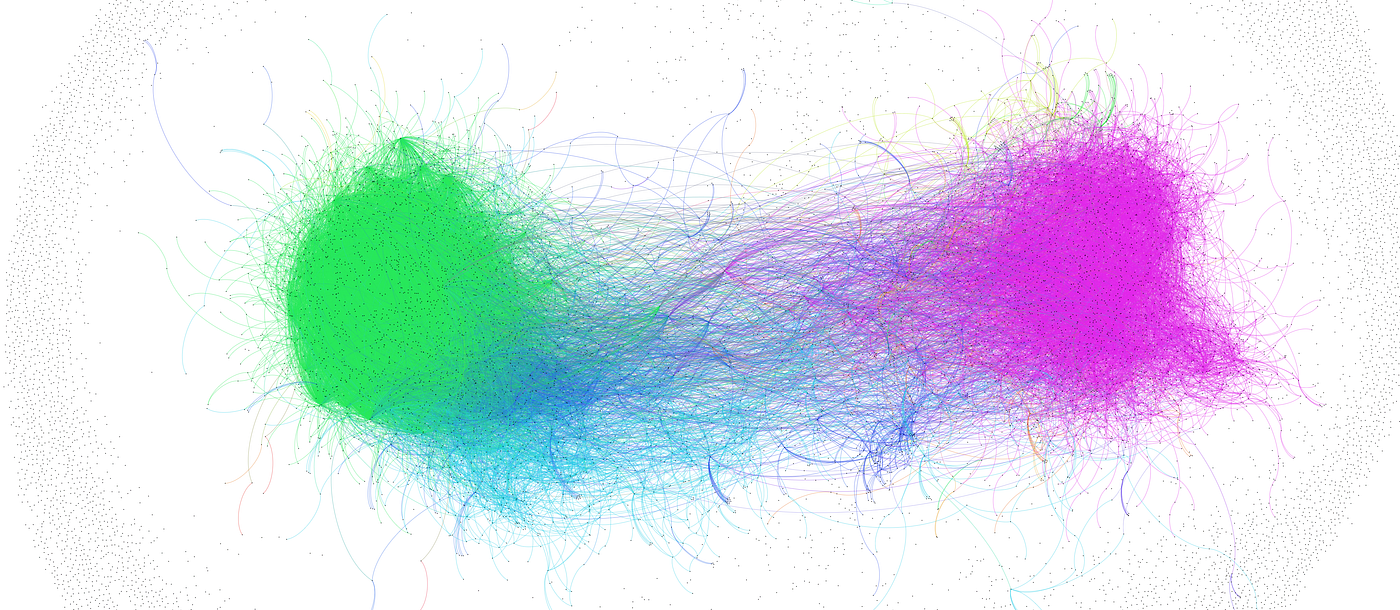
This network visualization is as good a metaphor as any for #Gamergate. Two massive, impenetrable hairballs of people that want little to do with one another, only listening to their side and firing volleys across the chasm.
Is it over yet?
The Data
Update: Originally, I was hosting complete downloads of the data here for anyone to play with, make their own visualizations, or simply fact-check my work.
Unfortunately, as it turns out, distributing the contents and metadata surrounding tweets is a violation of section 6b of Twitter’s Developer Policy. Twitter politely asked me to remove the downloads without sending lawyers, and I very much appreciate that approach.
My guess? This policy exists to protect the privacy of their users. Any downloadable dataset could include information that was subsequently deleted or made private by its owners, or removed by Twitter.
Pursuant to their guidelines, I’ve replaced the original dataset with a much more limited one, containing only the tweet ID and user ID. You can download it as a 9MB CSV or a 3MB ZIP.
I know this is far from ideal, but you can use this information to reconstruct the original dataset by using Twitter’s statuses/lookup API method, 100 tweets at a time. With their API rate limits, you should be able to grab up to 10,800 tweets an hour. Reconstructing the entire dataset would take around 29 hours.
Sorry, everyone.
(Note: This piece was originally published in The Message on Medium.)
Runnin' On Empty
Dave Fothergill’s Maya crowd simulation is hilarious and hypnotic:
But it’s missing a soundtrack, don’t you think?
Here, I made one for it over on Tilde.club.
Justin Hall at XOXO
We’re posting every XOXO talk on YouTube, one every weekday in speaker order, and we’re a little over halfway through. There’s some really amazing stuff in there already, it’s hard for me to even pick favorites. Jonathan Mann and Gina Trapani are personal highlights.
The most popular talk we’ve ever had, by a decent margin, is Anita Sarkeesian talking about the tactics used by sexist jerks to discredit her and other women online. Go watch it. There’s an interesting behind-the-scenes story there, but maybe another time.
I just posted Justin Hall’s talk today, and it’s pretty great.
When he gets onstage, you can see he’s visibly shaken. That’s my fault. Before I introduced him to the stage, I told the audience that his site was the inspiration for teaching myself HTML in 1995. I told him I’d followed his life online for over 20 years, he opened my eyes to ways of using the web I’d never considered, and that he deeply influenced the way I thought about technology.
I made Justin Hall cry. And then we cut out my intro from the video, making him look like a big crybaby. Whoops!
There’s so much I love about Justin’s talk.
In 1995, starting at age 19, he started spilling the most intimate details of his life online, from his father’s suicide, the drugs he was taking, and the interactions he was having with friends, family, lovers, and long-time partners.
He wanted everyone to experience this, so spread the word in person and on TV and on roadtrips, an evangelist for the web as a personal communications medium. A Johnny Appleseed for HTML, trying to use technology to generate empathy.
It didn’t play out quite like he expected.
It takes a profound sense of self-awareness to realize the flaws in your deepest-held beliefs, talk about them publicly, and do the work to fix them.
“We’re all scientists of our own lives. We’re all constantly running experiments, every day. And what the web allows us to do is to share our data. What are we learning about our experiments, about what it means to be a good person and be connected?
We can use the web to share those truths with each other and evolve them, because we don’t know!
Let’s learn together until we’re dead.”
Sounds good to me.
Gamergate Is Running Out of Heroes
If you follow me on Twitter, you’ve probably gleaned how I feel about Gamergate. I’m not even going to attempt to summarize it—this covers it pretty well.
When 4chan started banning every Gamergate-related thread from its videogame forum, the infuriated gamers fled to 8chan (aka ∞chan), a year-old spinoff with its own unique origin story. Gamergate was welcomed with open arms. (I’m guessing Moot wasn’t heartbroken to lose their business.)
So, I know this is a cheap thrill, but I find it incredibly satisfying to read threads on 8chan from Gamergate supporters mourning all their fallen heroes.
We got a taste of this early on with the ultra-savvy geek icons like Joss Whedon and Tim Schafer coming out publicly in support of Anita Sarkeesian, followed by waves of rage and hand-wringing.
But as Gamergate continues to grow, and its accompanying campaign of harassment escalates, more and more artists, writers, and critics are publicly taking a stand against it.
That’s led to a lot of disappointment and frustration from pro-Gamergate supporters mourning the betrayal of their heroes, as they disappear one by one into their Social Justice blacklists.
For someone who’s sick of the abuse, these 8chan threads are pure schadenfreude:
One: https://archive.today/JASOw
Two: https://archive.today/xnFKy
Among the fallen heroes mentioned: Patton Oswalt, Seth Rogen, Felicia Day, William Gibson, Tim Schafer, cartoonist Mariel Cartwright, Joss Whedon, writer Greg Rucka, Wil Wheaton, writer Jim Sterling, John Scalzi, Adam Sessler, Jon Stewart, and the creators of Raspberry Pi, who came out forcefully against #gamergate.
When prompted for alternatives to their lost idols, a handful of names are mentioned, but only those who have remained silent on the issue. Their best hope is that the silent are secretly on their side, since nobody else creating stuff seems to be. They mention Giant Bomb’s Jeff Gerstmann, and the artists behind the Oglaf and Nedroid comics as possible supporters.
I wondered aloud on Twitter if their silence actually meant their support. Anthony from Nedroid immediately replied:
@skinny @waxpancake @Oglaf @jeffgerstmann yes, they are wrong. I don’t support “gamergate” in any way and I think the whole thing is awful.
— Anthony (@nedroid) October 17, 2014
Oglaf’s Trudy Cooper replied later that night:
@nedroid @skinny @waxpancake @jeffgerstmann Completely wrong. I had no idea what "gamergate" was until just now. As if I'd support it, c'mon
— Bodil Bodilson (@Oglaf) October 17, 2014
This morning, Jeff Gerstmann posted a strong statement against Gamergate in an editor’s letter on Giant Bomb:
So when “GamerGate” rose up to cover over a campaign of harassment with a veneer of concern for the ethics of games journalism, it more or less set off every single disgust alarm I have. Though I’m sure some good people have been roped into this mess under this guise, the ethical concern portion of all this is largely a farce, a fallacy.
Cross those three off the idols list, I guess.
Towards the end of the thread, one commenter summed it up, “We have to accept that pretty much the entirety of western society has turned against us and chugged kool-aid like crazy.”
I’ve said it before—creating something new and putting it online is an act of bravery, and it exposes you to a tremendous amount of criticism. At any level of popularity, you deal with kneejerk contrarians, self-entitled fans, and anonymous haters—the bread and butter of the Gamergate movement.
It’s not too surprising that they’re having a hard time winning their heroes over to their side.
@waxpancake One would think the realization that "all my heroes are against me" might lead to some faint flicker of self-reflection.
— Patrick Smith (@Patrick5mith) October 17, 2014
Middling
Twitter’s for 140-character short-form writing and Medium’s for long-form. Weirdly, there really isn’t a great platform for everything in the middle — what previously would’ve just been called “blogging.” Mid-length blogging. Middling.
I think that’s partly why seeing Matt Haughey, Paul Ford, and Michael Sippey restart regular blogging on Paul’s delightfully retro tilde.club is so refreshing to me. I miss seeing people I admire post stuff longer than a tweet.
So I think I’ll try doing the same thing here. In the early days of Waxy.org, before I launched the linkblog, I used to blog short posts constantly. Multiple times a day. Twitter and Waxy Links cannibalized all the smaller posts, and as my reach grew, I started reserving blogging for more “serious” stuff — mostly longer-form research and investigative writing.
Well, fuck that. I miss the casual spontaneity of it all, and since I’m pretty sure hardly anybody’s reading my site again after the death of Google Reader, the pressure’s off.
What do I have to lose?
Update: Nice, Gina Trapani’s in too.
